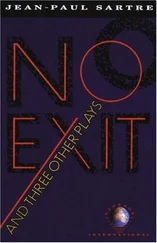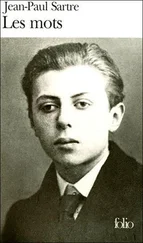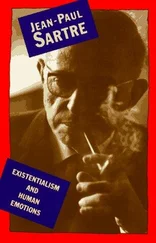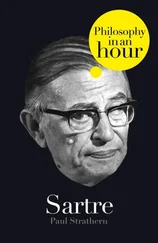31
Abd al-Rahman walked all the way to Place Edmond Rostand. He didn’t feel like going back to his apartment. He had mixed feelings, neither happy nor sad. He felt like watching the technicolor films at the Odéon cinema, the ones he had liked so much in Baghdad. He walked by the metro station, traffic lights, and many wonderful sights before reaching the cinema. Once the film began and he heard the music and became involved in the sentimental plot, he relaxed and very gradually became totally at ease.
32
When he left the theater, the cold had subsided but a fog had enveloped everything. He walked slowly in the night, wrapped in his thick coat, and took in the surroundings illuminated by the city lights. He stopped at a hotdog stand, ordered a hotdog with mustard, and smiled at the seller, remarking to himself how existentialist the scene was. As she was preparing his sandwich he said, “You know, that piled up roll reminds me of the French Revolution, when the revolutionaries impaled the king’s supporters.”
As he was eating his sandwich he saw Ahmad on the other side of the street. He called him over, and the two men walked together. Abd al-Rahman asked if he had seen Si Muammar, and Ahmad explained that he had only run into Nader in the Latin Quarter. “Didn’t he tell you anything about Si Muammar? Hasn’t he seen him?” Ahmad explained that Nader had not seen him and was, in fact, looking for him. Abd al-Rahman suggested they go looking for him in Place des Vosges. Ahmad advised him to wait until the following day, so the two of them spent the rest of the evening in a bar instead. The place was very dark except for a few faint lights. They could hear the noisy laughter of the drinking customers, and they soon joined them, ordering a bottle of whiskey and two glasses and kept on drinking in silence. When they left the bar they were both completely inebriated.
33
Before noon the following day Ahmad rushed into Abd al-Rahman’s room and woke him. Disoriented and still half asleep, he asked what was happening. Ahmad shouted, “I saw Nader in the Latin Quarter and he gave me a piece of sad news.”
Abd al-Rahman asked anxiously, “Something related to the Café de Flore waitress?”
“No, it’s about Si Muammar. His brother was killed in Algeria fighting the occupation forces. He’s a martyr.”
“Will Si Muammar be leaving France then?” Abd al-Rahman asked calmly.
“Yes,” said Ahmad.
Reflecting on the situation, the philosopher pondered, “He will have to fight against the colonialist now, won’t he!”
Deep down Abd al-Rahman was elated by the news, yet he managed to hide his feelings by expressing an exaggerated concern about two issues, Algeria’s future and existentialism. The Algerian revolution was growing, existentialism was leaning more and more toward revolution, and Abd al-Rahman was getting closer to his waitress. With Si Muammar’s departure she would be left without a lover, and he would step in to replace him. She’s French and wouldn’t be able to last long without a lover.
Ahmad told Abd al-Rahman that Si Muammar had asked to see them, together with all his friends, to receive their condolences. Abd al-Rahman was elated. For the first time he felt that luck was on his side, as he was finally on his way to win the waitress. He’d have the opportunity to meet her through her friend, all obstacles would disappear, and he would be left alone with her after Si Muammar’s departure. Once they started talking, she would get to know him and become attached to him like a Christian clings to his faith.
“This is great, great! This is my chance and I’ll grab it,” he said to a disgusted Ahmad, who didn’t say a word but went into the kitchen to fix breakfast.
34
On Wednesday evening Ahmad and Abd al-Rahman arrived at the Café de Flore. It was raining heavily, and when they went in their coats were soaked. Si Muammar was standing at the bar, his face flushed and his eyes filled with tears. He was totally drunk and could hardly stand up straight. The waitress was trying to help him, but he pushed her away. Nader came to the rescue, held him by the shoulders, and tried to calm him down. The café was empty except for two young Frenchwomen and a blond young man who was observing the situation with great interest and emotion. The philosopher didn’t know it, but he was witnessing the greatest struggle of the twentieth century and the end of western colonial power. He asked Ahmad what was happening, but Ahmad wasn’t sure, though he found the scene awkward. Then they heard Si Muammar shout drunkenly, “Leave me alone.”
In a strident voice the young Frenchman shouted, “Let him be. If he can’t destroy the west he can at least tear down its culture.”
“Leave me alone,” repeated Si Muammar, staggering in the direction of a table piled with books. He swept them onto the floor, went to the bar, took a half-filled bottle of cognac, poured it over the books, and lit them with his lighter, laughing loudly. “Hey, brothers, clap now! The comedy is over.” His tirade continued. “These are all imposters. Jean-Jacques Rousseau is a liar. Saint Simon is a liar with all his utopias. Voltaire is a lie, and so are Molière and Bergson. They deceived us, they deceived us. The biggest of all imposters is Sartre. He’s a liar— a colonialist lie!”
The books burned quickly, making a cracking sound. The waitress stood behind Si Muammar looking forlorn as he named each author whose book he tossed onto the pile — Alfred de Musset, Montaigne. The flames reflected off the ceiling and walls of the café and onto Abd al-Rahman’s face. He looked like a red ghost. Sartre’s book La nausée did not burn with the other books. Nader pushed it closer to the fire with his foot. When the philosopher saw Nader’s gesture he considered it a personal attack. He rushed to seize the book and save it from the fire and burned his hand in the process. He shouted, “Burn anything you want except this book. Burn anyone but Sartre.” He emitted a stream of invectives at Si Muammar, Nader, and all the café customers. He rushed at Si Muammar and tried to strike him, but he had already slipped to the floor, too drunk to maintain his balance.
Having rescued La nausée from total destruction, the two friends left the bar quickly and with agitation. In their rush to leave they forgot their coats on that rainy and extremely cold Parisian night.
35
Si Muammar returned to Algeria, but the philosopher’s joy at the news, which Ahmad reported to him, did not last. He soon learned that the waitress had left to join her lover there. This marked the end of a phase in the philosopher’s life.
36
Abd al-Rahman’s love for the Café de Flore waitress was a formative experience. He faced the definitive news of her departure for Algeria stoically, like the true and authentic existentialist he was in soul and mind. His was not an acquired existentialism like that of his contemporaries, the Arab poets, the philosophers, and the litterateurs who had been influenced by Suhail Idris or the existentialism transmitted by Abd al-Rahman Badawi in the journal al-Katib al-‘arabi .
Though there were widespread rumors and gossip that questioned the philosopher’s integrity, depth of experience, or the authenticity of his genius, his changing and unstable life provided proof of the opposite. It is important when scrutinizing his life to go all the way back to his childhood. It would be impossible to write the philosopher’s biography without scrutinizing that stage of his life in order to establish the strong and glorious aspects of his thinking, a gargantuan philosophy that influenced a whole generation. His philosophy was shaped by his childhood experiences. He was an existentialist even then, and his nausea began when he spied on his parents in their bedroom, contrary to rumors that attribute it to Suhail Idris’s novel al-Hayy al-latini (The Latin Quarter) published in 1953 in Beirut when that city was the capital of Arab culture. In reality the Iraqi existential philosopher was not influenced by this first existential Arabic novel, or al-Katib al-‘arabi . There is no proof that he was influenced by the writings of Abd Allah Abd al-Dayim or Shaker Mustafa, or even the translated works of Emile Shuwairi. Those who believed that the al-Adab journal shaped his existential vision were wrong. Equally mistaken were those who claimed that he was influenced by a visiting Iraqi professor from Paris who gave a lecture on existentialism at the College of Humanities in 1951.
Читать дальше












